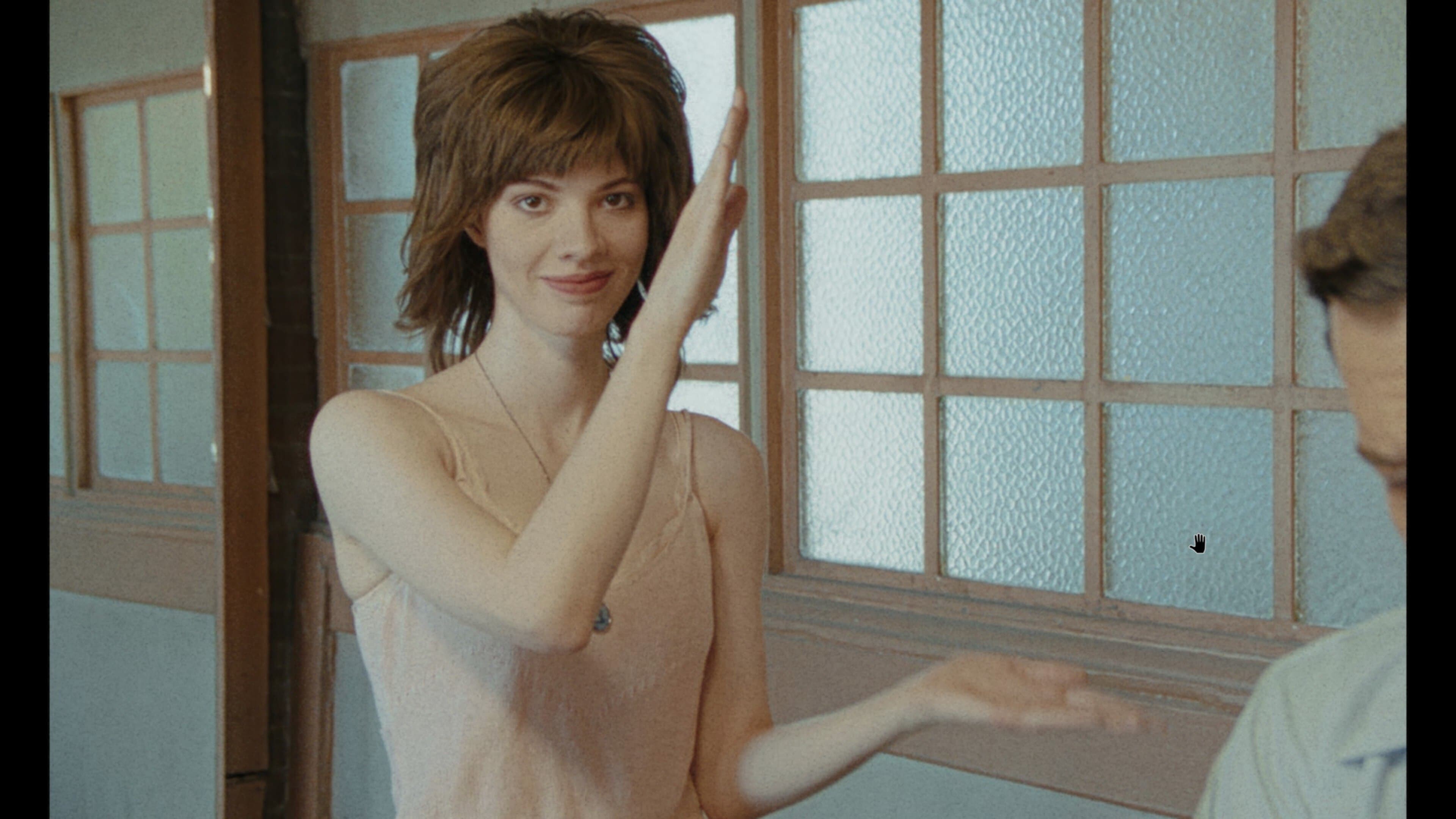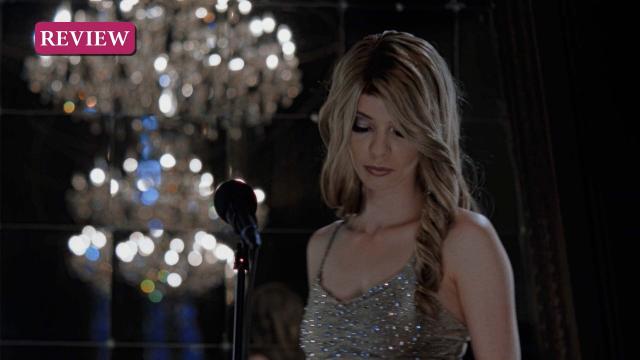In a movie, attitude is sometimes just as important to me as things like cinematography and production design. I stopped watching the 2001 Japanese film All About Lily Chou-Chou halfway through because its attitude toward teenage anxiety was so pessimistic and perverse that it made my soul feel like it was sinking. Conversely, Wong Kar-Wai’s 1994 Hong Kong romance Chungking Express had an attitude toward girlfriends that felt magically pure and unshakeable, and I had “California Dreamin’” stuck in my head for a week after watching. Immortality, the latest from Her Story creator Sam Barlow, is a game that functions like a movie. Its excitement lies within clever or opulent shots, lines delivered with pleasurable believability, and an alluring plot. But it has a real bad attitude about art.
The point of Immortality, the game tells you in an “About” section you can access from its loading screen, is to discover what happened to Marissa Marcel (a lethargic Manon Gage), a late 1960’s model-turned-actress whose movies never went public and whose presence dropped from time. It’s Barlow’s first horror game since Silent Hill: Shattered Memories in 2009, and it’s an interactive drama that continues the innovative full-motion video (FMV) storytelling tradition he started in Her Story and Telling Lies. Its story plays in big pools like art, religion, violence, and womanhood as it pertains to all three, which lends itself to compelling footage, but in the few hours it took me to complete this game, I couldn’t accept its overarching hostility toward art.
Marissa Marcel was meant to be a star, but when her movies Ambrosio, Minsky, and Two of Everything were never released, she turned, instead, into an abandoned attic. “Then in 2020, a breakthrough,” the game says. “A large cache of film was discovered containing footage from all three of Marcel’s movies.”
Your task is to sort through the scraps of film — bits of everything from movie scenes, backstage documentaries, and talk show clips to surreal, hidden digital sequences begging to be called Lynchian — through what the game calls a “piece of computer software” that mimics the Moviola film editing device.
Excitingly, the clip-oriented Moviola lends to a flexibility in gameplay, like in Barlow’s other FMV mysteries. You can lay the game flat or bend it as much as you’d like. You can watch Immortality like a 10-hour-long scrapbooked movie, reveling in its comfortable, grainy film with dark darks and brights as soft as jello. You can play like a true crime fanatic like I did, watching and rewatching clips in full, flipping through manual fast-forward and rewind functions with your keyboard or controller to uncover missed glances, evidence of that enigmatic layered footage.

Immortality wants to make you feel as obsessive as Marissa and the other artists its plot surrounds. It rewards a curious eye with evocative composition and design — stages with smoke spilling from the corners like they’re languidly sucking on cigarettes, lipstick-red roses, Marissa’s white skin under a thick cotton nightgown. Other things, like period-inappropriate clothing, distractingly bad wigs, and the actors’ usually indifferent faces are less exciting to look at, and they make watching clips in full feel like a chore.
But every metaphor-ripe detail, shoddy or not, provides a function. Unlike Barlow’s past games, where clips could be squared with keywords, you paste Immortality’s mystery together with a play on match cut, a movie edit that brings one scene into an unrelated next through visual or aural similarity.
In Immortality, this looks like pausing one clip to click a little white eye over a person, item of interest, or, I discovered, a woman’s breast, of which there are many, and get to a new clip to play. Clicking on a live snake in Ambrosio, for example, brought me to a woman wearing snake-shaped earrings in Minsky. This use of match cuts is novel, certainly, but it loses its intrigue quickly once you adjust to the surface glamor of the footage and find that everything else is lacking.
The script, which Barlow wrote with Telling Lies and Gaslit TV series writer Amelia Grey, Lost Highway writer Barry Gifford (Lynchian!), and Allan Scott, co-writer of Nicolas Roeg’s landmark 1973 horror film Don’t Look Now, is haunted and repulsed by the idea that an artist could live on in their work, particularly if that artist was a man who could in some way be construed as “problematic.” I find this anti-auteur stance strange considering Immortality is branded in its trailer as being a new game “from Sam Barlow,” but I’ll set that aside for now.
Immortality does not like auteurs. It turns its nose up against them like they’re made fully of salty ink-black licorice. Its plot is an open-ended retelling of the story repeated throughout history by Paganini nonbelievers, Oscar Wilde in The Picture of Dorian Grey, and online conspiracy theorists who maintain that Avril Lavigne was replaced by a body double in 2004, or that Lady Gaga murdered her friend and absorbed her personality. Fame is a killer, they all say, but the hubris and sacrifice that artistic greatness requires is even worse. It’s like selling your soul to the devil himself.
Fine, yeah, sure. To support this, the game’s dialogue is peppered with strange, outdated jabs at the western art canon’s pantheon. In one Two of Everything scene, poor Michelangelo, dead for 458 years, is at the brunt of it.
“You are no Michelangelo,” character Amy Archer (Jocelin Donahue) says to Marissa’s character. “I mean that as a compliment — all of Michelangelo’s women look like men with tits stuck on them.” Um, what?
The neo-noir Klute rewrite Minsky, Marissa’s second movie, centres around the murder of a Picasso-type. When the drier Donald Sutherland stand-in (Carl Goodman, played by Ty Molbak) asks Marissa’s character if the artist Minsky liked to dress up during sex, she says, “Yes, he was the girl. Like all pitchers, he was really a catcher inside. When he was fucking someone, he was only really fucking himself.” Um, again, what?
[review heading=”Immortality” image=”https://www.kotaku.com.au/wp-content/uploads/sites/3/2022/08/31/8f764c3aa5c274f508b9c3e3297785bc.jpg” label1=”Back of the Box Quote” description1=””Crimes against auteurs”” label2=”Developer” description2=”Sam Barlow, Half Mermaid ” label3=”Type of game” description3=”Interactive horror drama led by full-motion video” label4=”Platforms” description4=”Steam for PC (played on) and Mac, Xbox Series S/X, GOG, mobile via Netflix Games” label5=”Liked” description5=”Appealing set dressing, good use of film, innovative gameplay.” label6=”Disliked” description6=”Bad acting, lacklustre costumes, predictable, outdated storyline.” label7=”Release Date” description7=”August 30, 2022″ label8=”Played” description8=”5 hours, the minimum to “beat” the game” ]
Both of these comments depressingly fall in line with a dangerous old horror movie trope you’ll find in Psycho, Dressed to Kill, The Silence of the Lambs, and other movies too complacent to review why they present gender dysphoria or ambiguity as evil, unnatural, and abominably Other. Not willing to let a gross trope live on its own, Barlow also seems terrified of older women and their bodies, and the bulk of “scary” Immortality scenes feature them.
What Immortality wants to say is that the artistic heart, a thing the game loathes in dialogue and reveres in its visual references to great artists and films, is damned because male artists are too demanding, too willing to swallow up their willowy white muses. In making the game’s focus Marissa instead of one of her directors, Barlow tries to pull our cultural focus toward the women on set, who had vision, drive, and suffered through their coworkers’ creepy advances to give their art to the world.
There’s nothing wrong with that. I’d even call it appreciated, considering the often strained relationship between video games and the women in them. But Barlow’s thesis has been repeated for the last few centuries by women artists with nuanced and precious firsthand experiences that gave it sharp teeth, which Barlow lacks. Though he draws attention off the director and onto the actress, Barlow never gives Marissa any sense of agency. Everything happens to Marissa — the events of the game, her movies being delayed, even the action of the player finding her. Marissa is never allowed to find herself, to share her art the way she would have envisioned or wanted it. Because of this, Barlow turns into another black hole director, stealing his actress’ spotlight when he hoped to shine it only on her.

Much of Immortality’s post-Me Too movement commentary is hollow because of this. Instead of breaking ground for social commentary in video games, the game relies on platitudes to retell a story we’ve heard done better, more creatively, and with more conviction before. Barlow’s game is unsure of what it believes and, instead of rejoicing in its clear admiration for cinema, sex, and the craft of filmmaking, it cries and self-flagellates.
It can’t even express penance well because its cast, for the most part, is unable to reach the ideal middle-ground between expressionless and overblown. Partly for this reason, Marissa is a disappointing protagonist, and Gage’s performance is regrettably one-note (once during my playthrough, I fast-forwarded through a minutes-long clip to see if her blank face would change at all, and it didn’t). Marissa, despite all the posturing Barlow has imbued her with, comes across as a caricature of moralism, a sweet teenager corrupted and destroyed by her art as she aged.
“Marissa isn’t wearing any panties,” one character repeats salaciously before and after they shoot a scene. To this I thought, it’s 2022, am I really expected to interpret going commando as the peak of sexual deviance?
Another line I keep thinking about is Carl telling Marissa that when he was “driving in from the airport” into New York City for the film Minsky, he felt like he was “descending into hell.”
“It’s kind of a dark place, isn’t it?” he says.
“WowwwOOWOOWOW,” I wrote in my notes.
Often throughout my playthrough, I wondered how Barlow expects women artists to exist at all if he can only imagine them as sexy teenagers, being chewed and spit out by a Picasso, or forgotten by history completely.
How should artists live if he thinks that New York City in the 70’s, a holy garden for the Black Arts Movement, queer art and liberation, and a local feminist art movement, is hell? This attitude — it’s bleak, unhelpful, and revisionist. Despite Immortality’s interesting gameplay elements and occasionally exciting visual elements, I couldn’t unstick this thorn.
I want art to be a place where I can find love, beauty, or truth. Without these things, Marissa Marcel was better off lost.

Leave a Reply